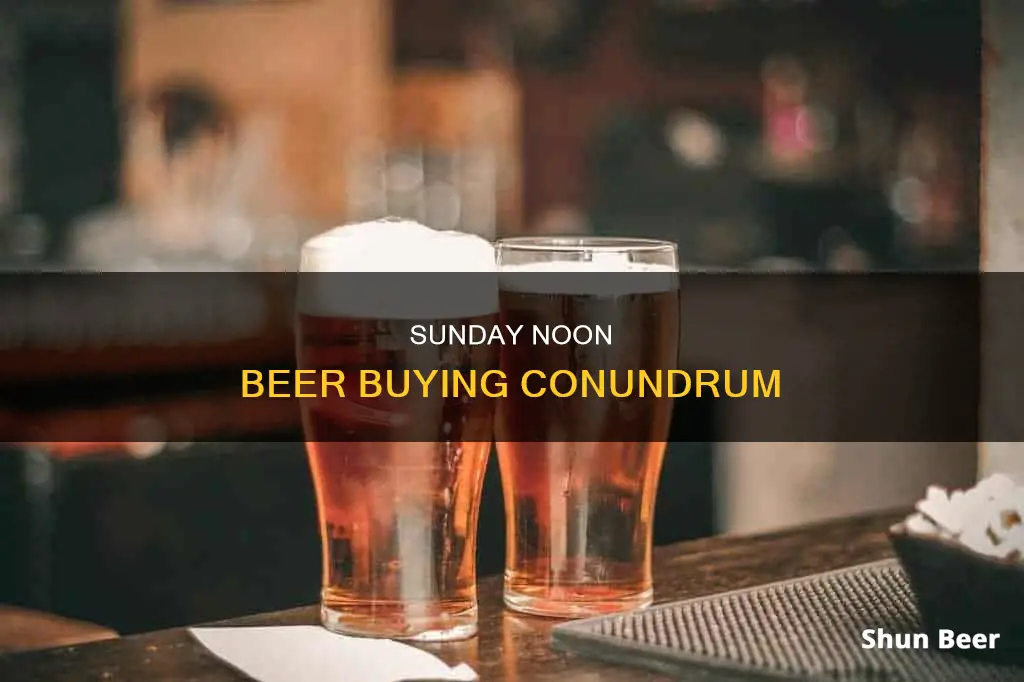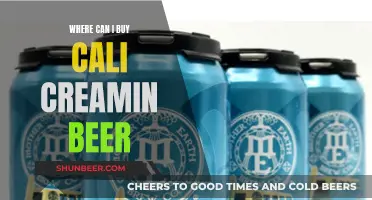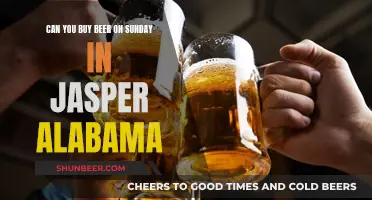
In many parts of the world, it is not possible to buy beer before noon on Sundays. This is due to the existence of blue laws, which are laws that restrict or ban some or all activities on specified days, often Sundays in the Western world. Blue laws are still enforced in parts of the United States, Canada, Austria, Germany, Switzerland, and Norway, and they are particularly common in the Southern United States. While some counties or towns may ban alcohol sales on Sundays entirely, others may only prohibit sales before a certain time, such as noon. These laws have been attributed to the influence of Christian churches, which aim to prevent people from drinking before they get out of church. However, the U.S. Supreme Court has also upheld blue laws on secular grounds, such as securing a day of rest for workers and contributing to societal stability.
| Characteristics | Values |
|---|---|
| Location | North Carolina, United States |
| Time | Before noon on Sundays |
| Beverage | Beer |
| Day | Sunday |
| Time Frame | 2 a.m. to 7 a.m. on any day, and until 12 p.m. on Sundays |
| Rationale | Religious reasons, particularly to promote the observance of a day of worship or rest |
What You'll Learn

In some places, you can't buy alcohol at all on Sundays
In some places, it is not possible to buy alcohol at all on Sundays. These laws, known as "blue laws" or "Sunday laws", are enforced in parts of the United States, Canada, and some European countries. While most blue laws have been repealed in the United States, many states continue to impose tighter restrictions on the sale of alcoholic drinks on Sundays.
For example, in Arkansas, 39 out of its 75 counties are "dry", meaning that the sale of any alcoholic beverage is entirely prohibited. In Connecticut, the sale of alcohol on Sundays was banned until 2012 when the law was repealed. Similarly, Georgia prohibited the sale of alcohol in stores on Sundays until 2011, and now sales are restricted before 12:30 pm on Sundays. Indiana also recently changed its law to allow Sunday alcohol sales between noon and 8 pm.
The origin of blue laws can be attributed to religion, particularly the Christian tradition of prohibiting the desecration of the Sabbath. However, the U.S. Supreme Court has upheld these laws, citing secular bases such as protecting workers and families, and contributing to societal stability.
The specific laws regarding alcohol sales vary from state to state and even county to county, with some places allowing alcohol sales only after a certain time on Sundays, while others prohibit sales altogether. These laws have been a source of frustration for many, especially those who wish to purchase alcohol for personal consumption or special occasions.
Helium Beer: Ohio's Legal Drinking Adventure
You may want to see also

In some places, you can't buy alcohol before 11am on Sundays
In some places, you can't buy alcohol before 11 am on Sundays. These laws, known as "blue laws", are in place in various states across the US, as well as some European countries. While many blue laws have been repealed, some states and counties continue to enforce them to varying degrees.
Blue laws are laws that restrict or ban some or all activities on specified days, usually Sundays in the Western world. They are primarily intended to promote the observance of a day of rest or worship, often rooted in religious traditions. While the origin of these laws is religious, they have also been upheld by the US Supreme Court for secular reasons, such as protecting workers and families and contributing to societal stability.
The specific restrictions on alcohol sales vary by location. For example, in North Carolina, alcohol sales are prohibited between 2 am and 7 am every day, and until 12 pm on Sundays. In Kentucky, packaged alcohol can be sold from 1 pm to 9 pm on Sundays. Indiana previously prohibited Sunday sales altogether but now allows sales starting at noon.
The enforcement of blue laws has been a source of frustration for many, especially those who do not follow the religious traditions that influenced their creation. Some view these laws as an imposition of Christian morals and a nuisance that interferes with their personal freedom. However, blue laws continue to be a part of the legal landscape in many places, impacting both residents and visitors alike.
Buying Beer Early: What Time Is Too Early?
You may want to see also

In some places, you can't buy alcohol before noon on Sundays
The origin of blue laws stems partially from religion, particularly the Christian tradition of prohibiting the desecration of the Sabbath. They are also enforced to secure a day of rest for workers and to protect families, thereby contributing to societal stability. However, some people view these laws as a way for the church to impose its influence and force its views on others.
The specific reasons behind the restriction on alcohol sales before noon on Sundays vary. Some speculate that it is to prevent people from drinking before they get out of church, while others suggest it is a compromise between churches and retailers or a way to deter people from loitering and drinking at gas stations.
These laws can cause inconvenience and frustration for those who want to purchase alcohol outside of the permitted hours, especially if they are unaware of the restrictions. However, blue laws continue to be enforced in certain places, impacting the availability of alcohol for residents and visitors alike.
Beer Run Buddy Blues: Can My Friend Get Caught?
You may want to see also

In some places, you can't buy refrigerated beer on Sundays
For example, in North Carolina, alcohol cannot be purchased between 2 a.m. and 7 a.m. on any day and until 12 p.m. on Sundays. In Indiana, only stand-alone liquor stores can sell refrigerated beer on Sundays; grocery stores and gas stations can only sell warm beer. In Kentucky, any packaged alcohol can be sold from 1 p.m. until 9 p.m. on Sundays.
The specific laws regarding alcohol sales on Sundays vary from state to state and even from county to county. Some counties or towns don't allow alcohol sales on Sundays at all, while others have more relaxed restrictions. These laws can be inconvenient for those who want to purchase alcohol, especially if they are visiting an area with different laws than they are used to.
The reasoning behind these laws is often attributed to the influence of the church in certain areas, with the belief that Christians don't want people to start drinking before they are out of church. However, there may also be other factors at play, such as giving store owners and employees a day off to spend with their families or preventing drunkenness during the morning hours when more children are likely to be out and about.
Buying Beer in Naples, Florida: Sunday Morning Laws
You may want to see also

In some places, you can't buy alcohol before 10am on Sundays
In some places, you can't buy alcohol before 10 am on Sundays. These laws, known as "blue laws", are still enforced in parts of the United States, Canada, and some European countries. While most blue laws have been repealed in the United States, many states continue to impose tighter restrictions on the sale of alcoholic drinks on Sundays.
Blue laws, or Sunday laws, are designed to restrict or ban some or all activities on Sundays, particularly to promote the observance of a day of rest. The origin of these laws stems from religion, specifically the Christian tradition of prohibiting the desecration of the Sabbath. However, the U.S. Supreme Court has upheld blue laws on secular grounds, such as protecting workers and families, and contributing to societal stability.
The specific restrictions under blue laws vary across different states and even counties. For example, in Arizona, alcohol sales on Sundays were previously limited to between 2 a.m. and 10 a.m., while in North Carolina, alcohol sales are prohibited between 2 a.m. and either 10 a.m. or 12 p.m. on Sundays, depending on the county. In Indiana, Sunday carry-out alcohol sales are allowed between noon and 8 p.m., while in Kentucky, packaged alcohol can be sold from 1 p.m. to 9 p.m. on Sundays.
The enforcement of blue laws has led to interesting dynamics, with some people crossing county or state lines to purchase alcohol when their local area has stricter regulations. Additionally, the laws have been criticised for imposing Christian morals while disregarding the holy days of other religions. Despite the criticisms and the gradual relaxation of some blue laws, many places continue to restrict alcohol sales on Sundays, making it challenging for those who wish to purchase alcoholic beverages during the morning or early afternoon.
The EBT Card Beer Buying Conundrum
You may want to see also
Frequently asked questions
Such laws, called "blue laws," were written to impose Christian morals on the population. They are designed to restrict or ban some or all Sunday activities for religious reasons, particularly to promote the observance of a day of worship or rest.
Blue laws are enforced in parts of the United States and Canada, as well as some European countries, including Austria, Germany, Switzerland, and Norway, where most stores remain closed on Sundays.
Yes, it depends on the specific state, county, or even town. For example, in Indiana, beer can be purchased at noon on Sundays, while in Kentucky, packaged alcohol can be sold from 1 pm to 9 pm.
Yes, some U.S. states have additional restrictions. For example, in Arkansas, 39 out of 75 counties are "dry," meaning the sale of any alcoholic beverage is entirely prohibited.
No, blue laws can restrict various activities on Sundays. For example, in some places, car dealerships are closed on Sundays, and there may be restrictions on hunting or sports competitions.







